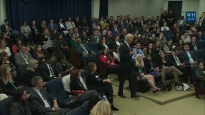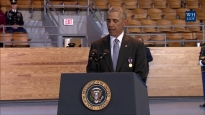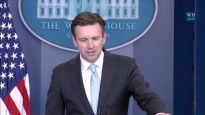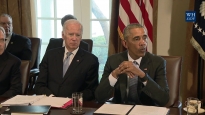Congressional Hispanic Caucus Institute’s 33rd Annual Award Gala
September 15, 2010 | 24:02 | Public Domain
President Obama speaks to members and guests at the Congressional Hispanic Caucus Institute’s 33rd Annual Award Gala in Washington, D.C.
Remarks by the President at the Congressional Hispanic Caucus Institute's 33rd Annual Awards Gala
Washington Convention Center
Washington, D.C.
8:34 P.M. EDT
THE PRESIDENT: Thank you very much. Thank you to Senator Menendez, and to the Chairwoman of the Congressional Hispanic Caucus, Congresswoman Velázquez, for those extraordinary introductions, but more importantly for the outstanding work that you do each and every day. Please give them a huge round of applause. (Applause.) Thank you to the Congressional Hispanic Caucus Institute for inviting us this evening. Michelle and I are thrilled to be here with so many friends to kick off Hispanic Heritage Month.
I want to acknowledge a few people before I begin my remarks. First, somebody who I believe is going to go down in history as one of the greatest Speakers of the House of all time -- Nancy Pelosi is here. (Applause.) Two of our outstanding Cabinet secretaries are in the house: Secretary of the Interior, Ken Salazar -- (applause) -- and our wonderful Secretary of Labor, Hilda Solis. (Applause.)
I want to thank our Mistress of Ceremonies, Soledad O’Brien. I want to congratulate Eva Longoria Parker and Arturo Sandoval and Lin-Manuel Miranda on your well-deserved awards this evening. (Applause.)
AUDIENCE MEMBER: We love you, Obama!
THE PRESIDENT: I love you back! (Applause.) And I want to thank all the members of Congress, the local elected officials, the CHCI alumni, and all who work day in and day out to advance the Hispanic community and America as a whole.
I also want to acknowledge and thank all of the outstanding Latino leaders serving across my administration because I am proud that the number of Latinos I’ve nominated to Senate-confirmed positions at this point far exceeds any administration in history. (Applause.) And I’m especially proud that a whole bunch of them are Latinas. (Applause.) And as I’ve said before, one of my proudest moments of my presidency was the day Justice Sonia Sotomayor swore an oath -- (applause) -- and ascended to our nation’s highest court, and sparked new dreams for countless young girls all across America.
Now, some of you may remember I first joined you here two years ago, as a candidate for this office. And we spoke then about how, after years of failed policies here in Washington, after decades of putting off the toughest challenges, we had finally reached a tipping point -- a point where the fundamental promise of America was at risk.
We talked about how these challenges impacted the Latino community, but also about how they’re bigger than any one community. I said then that if a young child is stuck in an overcrowded and underperforming school, it doesn’t matter if she is black or white or Latino, she is our child, and we have a responsibility to her. (Applause.) That if millions of Latinos end up in the emergency room because they don’t have health care, it’s not just a problem for one community, it’s a problem for all of America. (Applause.) When millions of immigrants toil in the shadows of our society, that’s not just a Latino problem, that is a American problem. We’ve got to solve it. (Applause.)
As Dr. King told Cesar Chavez all those years ago: Our separate struggles are really one. And that truth became painfully clear when, less than a week after I had appeared before the CHC, some of the biggest Wall Street firms collapsed and the bottom fell out of our economy. Millions of families across America were plunged into the deepest recession of our lifetimes. And a Latino community that had been hard-hit before the recession was hit even harder.
So when I took office, I insisted that we could only rebuild our economy if we started growing the economy for all of our people, not just some of our people -- (applause) -- if we provided economic security for all of our working families all across America. We had to renew the fundamental idea that everybody in America -- everybody in America -- has a chance to make it if they try no matter who they are, no matter what they look like, no matter where they come from or where they were born.
That’s the idea that drives us: the chance to make of our lives what we will. And I know that many of you are thinking tonight about a task that is central to that idea -- and that’s our fight to pass comprehensive immigration reform. (Applause.)
Now, I know that many of you campaigned hard for me, and understandably you’re frustrated that we have not been able to move this over the finish line yet. I am too. But let me be clear: I will not walk away from this fight. (Applause.) My commitment is getting this done as soon as we can. We can’t keep kicking this challenge down the road.
There’s no doubt the debate over how to fix all this has been a fractured and sometimes painful one in this country. And let’s face it, there are some who seek political advantage in distorting the facts and in dividing our people. We’ve seen it before. Some take advantage of the economic anxiety that people are feeling to stoke fear of those who look or think or worship differently -- to inflame passions between “us” and “them.”
I have news for those people: It won’t work. There is no “us” and “them.” In this country, there is only “us.” (Applause.) There is no Latino America or black America or white America or Asian America. There is only the United States of America -- all of us. (Applause.) All of us joined together. Indivisible.
If we appeal to the American people’s hopes over their fears, we’ll get this done. We already know what this reform looks like. Just a few years ago, when I was a senator, we built a bipartisan coalition around a basic framework under the leadership of Senator Kennedy and Senator McCain and President Bush. We rallied with leaders from the business community and the labor communities and the religious communities. Many of you were there. And the bill we forged wasn’t perfect. It wasn’t what any one person might think was optimal.
But because folks were willing to compromise, we came up with a commonsense, comprehensive reform that was so far from the false debates, the notion that somehow on the one hand there’s mass amnesty or on the other hand there’s some unworkable mass deportation. That wasn’t what we were talking about. And the American people, I think, were ready to embrace a commonsense solution. And we passed that bill through the United States Senate.
But since that effort fall apart -- fell apart, we have seen how broken and bitter and divisive our politics has become. Today, the folks who yell the loudest about the federal government’s long failure to fix this problem are some of the same folks standing in the way of good faith efforts to fix it. (Applause.) And under the pressures of partisanship and election year politics, most of the 11 Republican senators who voted for that reform just four years ago have backed far away from that vote today.
That’s why states like Arizona have taken matters into their own hands. And my administration has challenged that state’s law -- not just because it risks the harassment of citizens and legal immigrants, but it is the wrong way to deal with this issue. (Applause.) It interferes with federal immigration enforcement. It makes it more difficult for law -- local law enforcement to do its job. It strains state and local budgets. And if other states follow suit, we’ll have an unproductive and unworkable patchwork of laws across the country.
We need an immigration policy that works -- a policy that meets the needs of families and businesses while honoring our tradition as a nation of immigrants and a nation of laws. We need it for the sake of our economy, we need it for our security, and we need it for our future.
And I understand it may not be the easy thing to do politically. It’s easier to grandstand. But I didn’t run for President to do what’s easy. I ran to do what’s hard. I ran to do what’s right. And when I think something is the right thing to do, even my critics have to admit I’m pretty persistent. I won’t let it go. They can call me a lot of things, but they know I don’t give up. (Applause.)
Now, the Senate is going to have a chance to do the right thing over the next few weeks when Senator Reid brings the DREAM Act to the floor. (Applause.) Keep in mind, in the past, this was a bill that was supported by a majority of Democrats and Republicans. There’s no reason why it shouldn’t receive that same kind of bipartisan support today. I’ve been a supporter since I was in the Senate, and I will do whatever it takes to support the Congressional Hispanic Caucus’ efforts to pass this bill so that I can sign it into law on behalf of students seeking a college education and those who wish to serve in our country’s uniform. It’s the right thing to do. We should get it done. (Applause.)
Now, I want to be straight with you. To make real progress on these or any issues, we’ve got to break the Republican leadership’s blockade. Let’s be clear about this. Without the kind of bipartisan effort we had just a few short years ago, we can’t get these reforms across the finish line. Their leadership has made reaching 60 votes the norm for nearly everything the Senate has to do. The American people’s business is on hold because, simply put, the other party’s platform has been “no.”
For example, consider the public servants I’ve nominated to carry out the people’s business. Most of them had been supported widely and approved unanimously by Senate committees. But they’ve been held up for months by the Republican leadership. We can’t even get an up-or-down vote on their confirmation. I nominated a man that you all know well.
AUDIENCE MEMBER: Salazar!
THE PRESIDENT: Well, I did nominate Salazar. I got him confirmed. (Laughter.) Raul Yzaguirre, to be our Ambassador to the Dominican Republic. (Applause.) Raul is right here. Now, Raul has been waiting for 10 months to be the Ambassador to the Dominican Republic. Right now, there are 21 judges who’ve been held up for months while their courts have sat empty. Three of them are outstanding Latinos, like Judge Albert Diaz, who I nominated to the Fourth Circuit Court. He’s been waiting for 10 months. This is a widely respected state court judge, military judge, and Marine Corps attorney. He was approved unanimously by the Judiciary Committee. But just last month, the Senate Republican leader objected to a vote on his confirmation yet again. And when he was asked why, he basically admitted it was simply partisan payback. Partisan payback.
We can’t afford that kind of game-playing right now. We need serious leaders for serious times. That’s the kind of leadership this moment demands. That is what we need right now. Because when I get out of this town and I’m meeting with people, talking to folks, nobody is asking me, “Hey, Barack, which party is scoring more points?” Nobody is saying, “Oh, don’t worry about us, I just want you to do what’s best for November.”
What they’re interested in is how they’re going to find a job when they’ve only known one trade their whole life; how are they going to put their kids through school; how are they going to pay the bills if they get sick; how are they going to retire when their savings have plunged after this financial crisis. They’re the folks we’re here for. They’re the folks we’re fighting for.
That’s why we passed Wall Street reform -- for every hard-working family who’s tired of taken -- getting taken advantage of every time they opened their credit card bill, or mortgage payment, or tried to send a remittance -- send a payment to help their parents or families abroad.
That’s why we’re reforming America’s schools so that all our children have a chance to learn the skills they need for today’s economy. We eliminated tens of billions of dollars in wasteful subsidies to big banks that provide student loans, and we’re taking that money to make college affordable for millions of students, including more than a hundred thousand Latino students. That's what the CHC did. That's what this administration did. (Applause.)
That’s why we passed health insurance reform for Americans who are sick of being gouged by insurance companies that jack up rates and deny coverage because you’ve got a preexisting condition. Now, millions of Americans with insurance can get free preventive care. Now, 9 million Latinos and tens of millions of Americans will be able to afford quality health care for the first time. (Applause.)
That’s why we cut taxes for small business owners and 95 percent of working Americans.
AUDIENCE MEMBER: Puerto Rico bless you, Obama!
THE PRESIDENT: Thank you. (Applause.) Instead of giving tax breaks to corporations to create jobs overseas, we’re cutting taxes for companies that put our people to work here at home. Instead of tax breaks for the wealthiest Americans who don’t need them and weren’t even asking for them, we’re fighting to cut taxes for you, middle-class folks all across the country. That’s what we’re about. That’s what we’re fighting for. (Applause.)
And when it comes to just about everything we’ve tried to do, almost every Republican in Congress has folded their arms and said no. Even where we usually agree, they say no. They’re thinking about the next election instead of the next generation, trying to score political points instead of solving problems. They said no to help for small businesses. No to middle-class tax cuts. No to making college affordable. No to comprehensive immigration reform. Their platform, apparently, is “no se puede.” (Laughter.) Is that a bumper sticker you want on your car?
AUDIENCE: No! (Laughter.)
THE PRESIDENT: In fact, the chairman of their campaign committee said that if they take over, they’d go back to “the exact same agenda” -- that's a quote -- “the exact same agenda” they had when they were in power. They’re saying they’ll repeal Wall Street reform. They’ll try to repeal health insurance reform. They’ll give the special interests a pen and let them write the rules again.
And right now, because of that Republican blockade, those special interests -- even foreign corporations -- can spend tens of millions of dollars on campaign ads without even having to disclose who they are. You’ve seen some of these ads. You know, they call themselves “Americans for Apple Pie” or “Moms for Motherhood.” (Laughter.)
And then they use their voice to drown out yours. To let Wall Street write rules that take advantage of Main Street. To let insurance companies write rules that let them cover or drop folks whenever and however they please. To go back to that “exact same agenda.”
Well, tell me you something. That agenda didn’t work out so well for the Latino community. It didn’t work out for anybody here in America. It is not going to solve the challenges we face. We can’t go backwards. We’ve got to go forwards.
So let me say this, not just to the folks who are in this room, but to the Latino community across this country. You have every right to keep the heat on me and keep the heat on the Democrats, and I hope you do. That's how our political process works. (Applause.)
But don’t forget who is standing with you, and who is standing against you. (Applause.) Don’t ever believe that this election coming up doesn’t matter. Don’t forget who secured health care for 4 million children, including the children of legal immigrants. Don’t forget who won new Pell Grants for more than 100,000 Latino students. Don’t forget who fought for credit card reform, a new agency to protect consumers from predatory lending, and protections for folks who send remittances back home. Don’t forget who cut taxes for working families. Don’t forget who your friends are. No se olviden. Don’t forget. (Applause.)
We can’t go back now. Not when there is so much work to be done. We’ve got to move forward. We’ve got to move forward on jobs, and on the economy, and on immigration reform, and all the unfinished business of our time. These are serious times. They require serious leaders and serious citizens, and your voice matters. Your voice can make the difference.
So let me close by saying this. Long before America was even an idea, this land of plenty was home to many peoples. To British and French, to Dutch and Spanish, to Mexican -- (applause) -- to countless Indian tribes. We all shared the same land. We didn’t always get along. But over the centuries, what eventually bound us together -- what made us all Americans -- was not a matter of blood, it wasn’t a matter of birth. It was faith and fidelity to the shared values that we all hold so dear. We hold these truths to be self-evident, that all men are created equal, endowed with certain inalienable rights: life and liberty and the pursuit of happiness.
That’s what makes us unique. That’s what makes us strong. The ability to recognize our common humanity; to remember that in this country, equality and opportunity are not just words on a piece of paper, they’re not just words in the mouths of politicians -- they are promises to be kept.
And that is our calling now -- to keep those promises for the next generation. No matter which way the political winds shift, I will stand with you for that better future. (Applause.) And if you stand with me, and if we remember that fundamental truth -- that divided we fall, but united we are strong, and out of many, we are one -- then you and I will finish what we have started. We will make sure that America forever remains an idea and a place that’s big enough and bold enough and brave enough to accommodate the dreams of all our children and all our people for years to come. Si, se puede.
Thank you. God bless you, and God bless the United States of America. Thank you. (Applause.)
END
8:59 P.M. EDT
|
January 6, 2017
|
January 6, 2017
|
January 5, 2017
|
January 5, 2017
|
|
January 4, 2017
|
January 4, 2017
|
January 4, 2017
|
January 4, 2017
|
- &lsaquo previous
- 1
- 2
- 3
- 4
- 5
- 6
- 7
- 8
- 9
- …
- next &rsaquo







